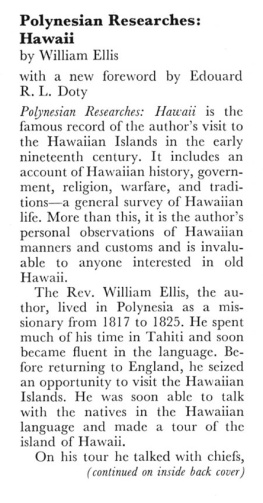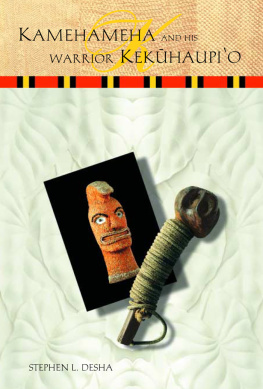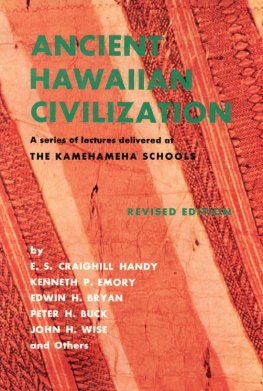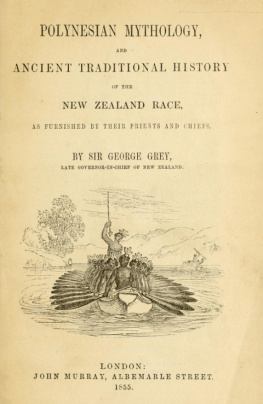Copyright 2017 Read Books Ltd.
This book is copyright and may not be
reproduced or copied in any way without
the express permission of the publisher in writing
British Library Cataloguing-in-Publication Data
A catalogue record for this book is available from the
British Library
As made up of legendary accounts of places and personages, it (mythology) is history; as relating to the genesis of the gods, the nature and adventures of divinities, it is religion.Native Races of the Pacific States, H. H. Bancroft, vol. iii. p. 14.
It is now a recognised principle of philosophy, that no religious belief, however crude, nor any historical tradition, however absurd, can be held by the majority of a people for any considerable time as true, without having in the beginning some foundation in fact.... We may be sure that there never was a myth without a meaning; that mythology is not a bundle of ridiculous fancies invented for vulgar amusement; that there is not one of those stories, no matter how silly or absurd, which was not founded in fact, which did not once hold a significance.Ibid., vol. iii. pp. 16, 17.
The fact of an immigration, and the quarter from which it came, are handed down from father to son, and can scarcely be corrupted or forgotten, unless in the case where the people sink into absolute barbarism.Essay ii. book vii. of Herodotus, edited by G. Rawlinson.
PREFACE

WHEN a gentleman, whose genius and talents have secured for himself one of the curule chairs in the republic of letters, introduces a blushing aspirant, his name becomes a voucher for the respectability of the latter, and his favete linguis ensures an attentive hearing until the close of the performance. But we are not all born with a silver spoon, and many an author, like myself, has had to bear the double burden of introducing himself as well as his subject. But when a writer presents himself with new discoveries, and new ideas based upon them, the reader has a right to inquire who the writer is, and if his discoveries are genuine, before he exercises his judgment upon the ideas submitted for his acceptance. It is meet and proper, therefore, on entering upon ground so little travelled as that of Polynesian Archology, on presenting myths and legends to the inspection of the literary world some of which have never darkened a sheet of paper before, that I should state my right to present them, how I came by them, and also the lights which guided and the aids which assisted me on the journey.
Thirty-four years residence in the Hawaiian group; nineteen years position in various offices under the Government; a thorough local and personal knowledge of every section of the group, acquired during numerous journeys; my knowledge of the language, and the factthough with all due modesty I state itthat I am well known, personally or by reputation, to every man within the group, from the King on the throne to the poorest fisherman in the remotest hamlet;all these considerations give me a right to speak on behalf of the Polynesian people, to unveil the past of their national life, to unravel the snarled threads of their existence, and to pick up the missing links that bind them to the foremost races of the world,the Arian and the Cushite.
Thus much, though reluctantly, I have felt bound to say in vindication of my right to be the spokesman of a people whom no one knew till a hundred years ago, and whom no one even now recognises as a chip of the same block from which the Hindu, the Iranian, and the Indo-European families were fashioned.
When first I entertained the idea of preparing myself for a work on Polynesian Archology, I employed two, sometimes three, intelligent and educated Hawaiians to travel over the entire group and collect and transcribe, from the lips of the old natives, all the legends, chants, prayers, &c., bearing upon the ancient history, culte, and customs of the people, that they possibly could get hold of. This continued for nearly three years. Sometimes their journeys were fortunate, sometimes rather barren of results; for the old natives who knew these things were becoming fewer and fewer every year, and even theyas is well known to every one that has had any experience in the mattermaintain the greatest reserve on such subjects, even to their own countrymen; and to a foreigner, unless most intimately and favourably known, any such revelation is almost impossible. The labours of my employees, however, were crowned with results exceeding my expectations, and I am now in possession of probably the greatest collection of Hawaiian lore in or out of the Pacific. It took me a long time, during leisure moments from official duties, to peruse, collate, and arrange these materials, and, though they are filled with much that was worthless for my purpose, yet I found very many pearls of invaluable price to the antiquarian and historian.
To this expos of my own pursuits, I would only add that, during my many journeys from one end of the group to the other, I never omitted an opportunity in my intercourse with the old and intelligent natives to remove a doubt or verify a fact bearing upon the work I had in hand.
Among Hawaiian authors and antiquarian literati, to whom I gratefully acknowledge my obligations, are, in the first place, his Majesty King KALAKAUA, to whose personal courtesy and extensive erudition in Hawaiian antiquities I am indebted for much valuable information; the late Hon. LORRIN ANDREWS; and the late DAVID MALO, whose manuscript collections were kindly placed at my disposal by the Honourable Board of Education; the late Dr. JOHN RAE of Hana, Maui, who, in a series of articles published in the Polynesian (Honolulu, 1862), first called attention to the extreme antiquity of the Polynesian language; the late Hon. S. M. KAMAKAU, with whom I have conferred both often and lengthily; the late Rev. Mr. DIBBLE, whose History of the Sandwich Islands (1843) contains many gems of antiquarian value; the late Hon. NAIHE of Kohala, Hawaii, and the late S. N. HAKUOLE. Mr. J. KEPELINO has furnished some valuable chants, and the groundwork of the Kumuhonua legends, most of which was confirmed by the late Mr. Kamakau above referred to. The current communications, from time to time, in the Hawaiian journals on antiquarian subjects, by different authors, have been carefully culled, and are thankfully remembered. Mr. JULES REMY is personally and kindly remembered since his sejour on the Hawaiian islands, and his Introduction to and edition of the Moolelo Hawaii (Paris and Leipzig, 1862), as well as his Recits dun vieux Sauvage, pour servir a lHistoire ancienne de Hawaii (1859), have been carefully considered and found of great value.












